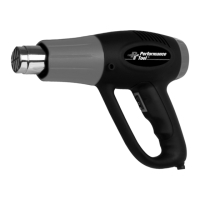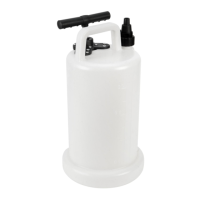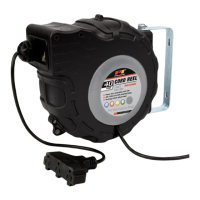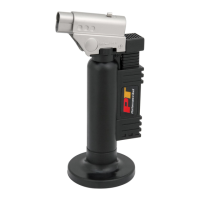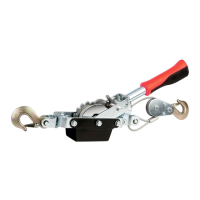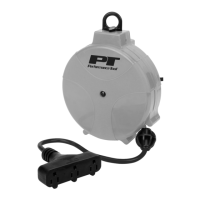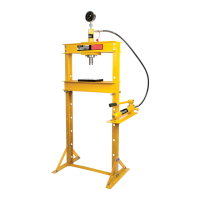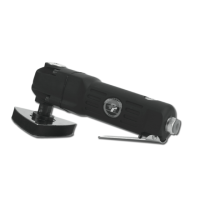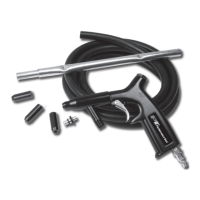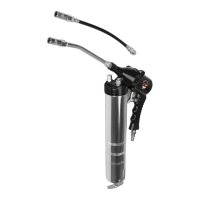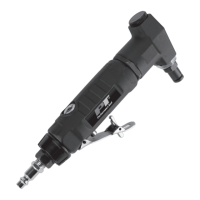4
IMPORTANT SAFETY INFORMATION
ammable materials such as dust, wood chips,
insulation, rodent nests and other debris which
could accidentally ignite. Use your heat gun for
stripping paint from solid woodwork with ins and
outs such as solid Interior trim, moulding, turn-
ings, doors, balusters and porch trim, etc.
• When working in these locations, keep the power
tool moving in a back-and-forth motion. Linger-
ing or pausing in one spot could ignite the panel
or the material behind it.
• Use extreme caution if the other side of the
material being scraped is inaccessible, such as
house siding. The hidden side could catch on
re if it becomes too hot. Some buildings contain
highly ammable materials behind siding, oors,
facia, soft boards and other panels. Check
these areas before applying heat and do not use
a heat tool if ammable materials are present or if
you are unsure of the hidden material.
• When working with plastics, varnish, or similar
materials, gases develop that are easily am-
mable and can lead to explosions.
• Do not use near surfaces with cracks or near
metal pipes or ashing. Heat may be conducted
behind the work surface and ignite hidden
material. The ignition of hidden materials may not
be readily apparent and can result in property
damage and injury.
• Do not use power tools in the presence of am-
mable liquids or gases.
• Do not use near combustible materials such as
dry grass, leaves, and paper which can scorch
and catch re.
• The nozzle becomes very hot. Do not lay the heat
gun on ammable surfaces when operating the
gun or immediately after shutting the gun off.
Always set the gun on a at, level surface so that
the nozzle tip is directed upwards and away from
the supporting surface.
• Do not point the power tool at people or animals
The intense heat can injure them.
• NEVER direct tool at clothing, hands or other
body parts. NEVER USE AS A HAIR DRYER.
• This power tool emits high temperature heat
at the nozzle. Keep hands and body out of the
heated air stream and never grasp the power
too by the nozzle. Wearing protective gloves and
safety glasses is recommended.
• NEVER touch work surface with nozzle. Keep at
least 1" away.
• Do not heat chemicals. Avoid the hazards of
ignition or the release of harmful vapors.
• Do not use the Heat Gun on glass.
• Always hold tool by the handle or use the
included stand. NEVER touch the nozzle opening
or nozzle shield until the tool is cool.
• Tools and paint scrapings become very hot. To
avoid burns, use work gloves when scraping.
• Always treat the hot air units with the same
respect as an open ame.
• Because this power tool has the appearance of
a household hair dryer, keep out of the reach of
children and advise other persons having access
to it of its high heat capabilities.
• WARNING: With a heat gun, as with all other
tools, ALWAYS KEEP A FIRE EXTINGUISHER
HANDY and be sure to observe sensible re
precautions.
25. LEAD POISONING PREVENTION. Extreme
care should be taken when stripping paint. The
peelings, residue and vapors of paint may contain
lead, which is poisonous. Any paint applied to
homes before 1950 is likely to contain lead. Any
paint manufactured before 1977 may contain
lead. Once the paint is deposited on surfaces,
hand-to-mouth contact can result in the ingestion
of lead. Exposure to even low levels of lead can
cause irreversible brain and nervous system dam-
age. Young and unborn children are particularly
vulnerable to lead poisoning. Before beginning
any paint removal process you should determine
whether the paint you are removing contains lead.
This can be done by your local health department
or by a professional who uses a paint analyzer to
check the lead content of the paint to be removed.
Lead-based paint should only be removed by a
professional and should not be removed using a
heat gun. To prevent potential lead poisoning, the
following precautions should be followed:
• Move the work piece outdoors. If this is not
possible, keep the work area well ventilated.
Open the windows and put an exhaust fan in one
of them. Be sure the fan is moving the air from
inside to outside.
• Remove or cover any carpets, rugs, furniture,
clothing, cooking utensils and air ducts.
• Place drop cloths in the work area to catch any
paint chips or peelings. Wear protective clothing
such as extra work shirts, overalls and hats.
• Work in one room at a time. Furnishings should
be removed or placed in the center of the room
and covered. Work areas should be sealed off
from the rest of the dwelling by sealing doorways
with drop cloths.
• Children, pregnant or potentially pregnant
women and nursing mothers should not be pres-
ent in the work area until the work is done and all
cleanup is complete.
• Wear a dust respirator mask of a dual lter
respirator mask for dust and fumes which has
been approved by the Occupational Safety
and Health Administration (OSHA) the National
Institute of Safety and Health (NIOSH), or the
